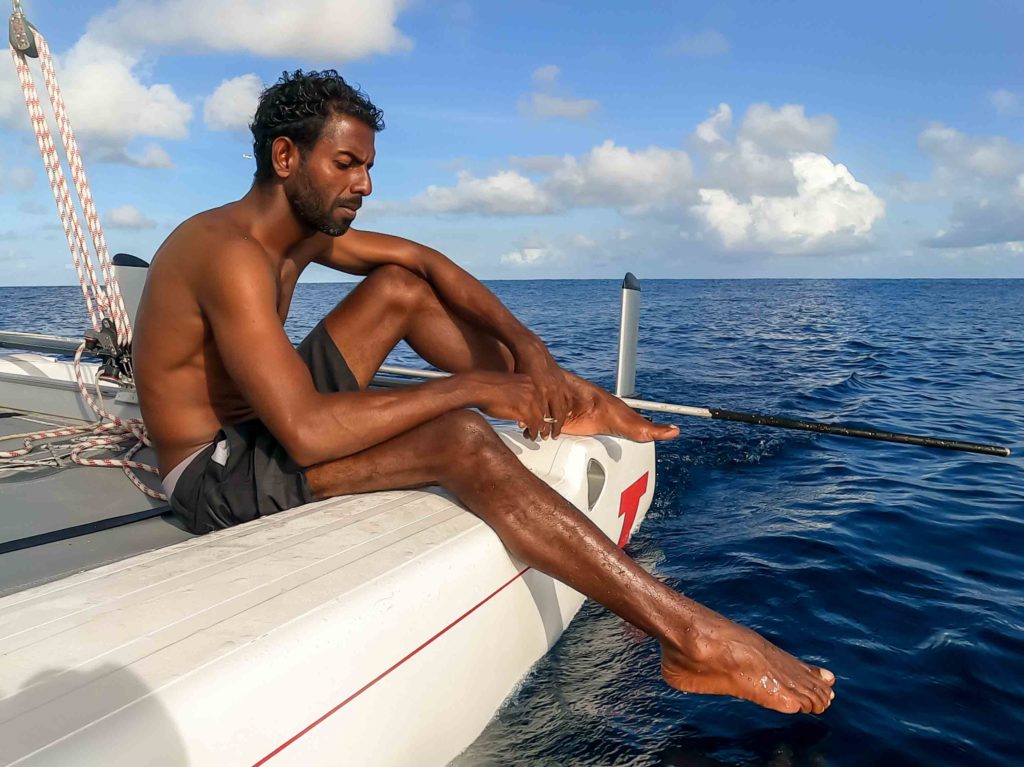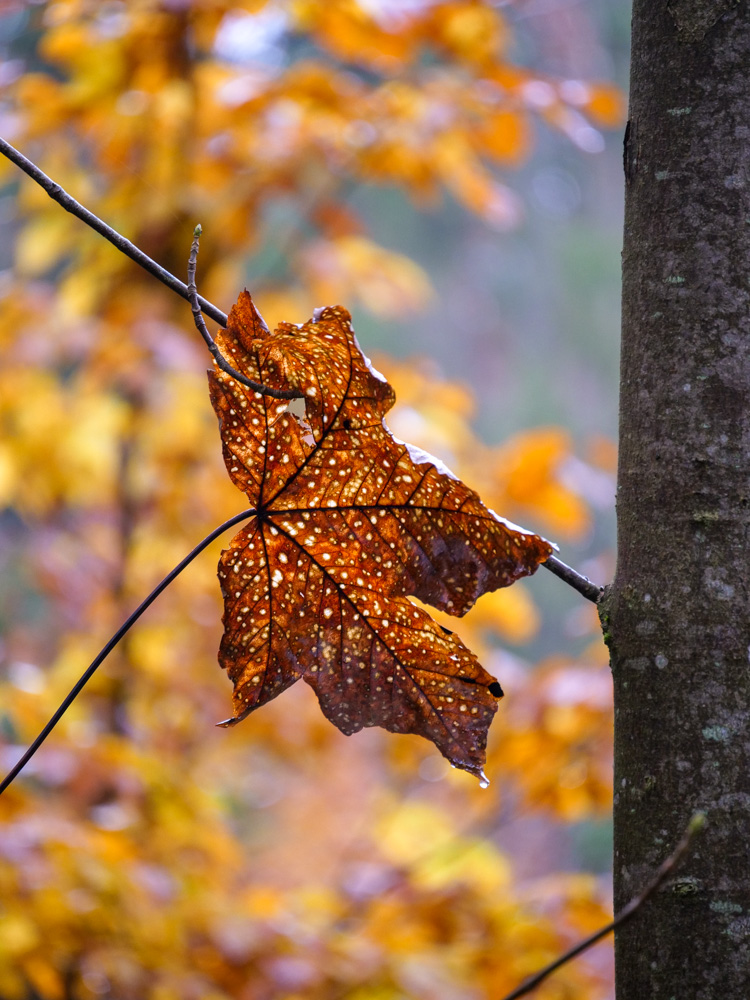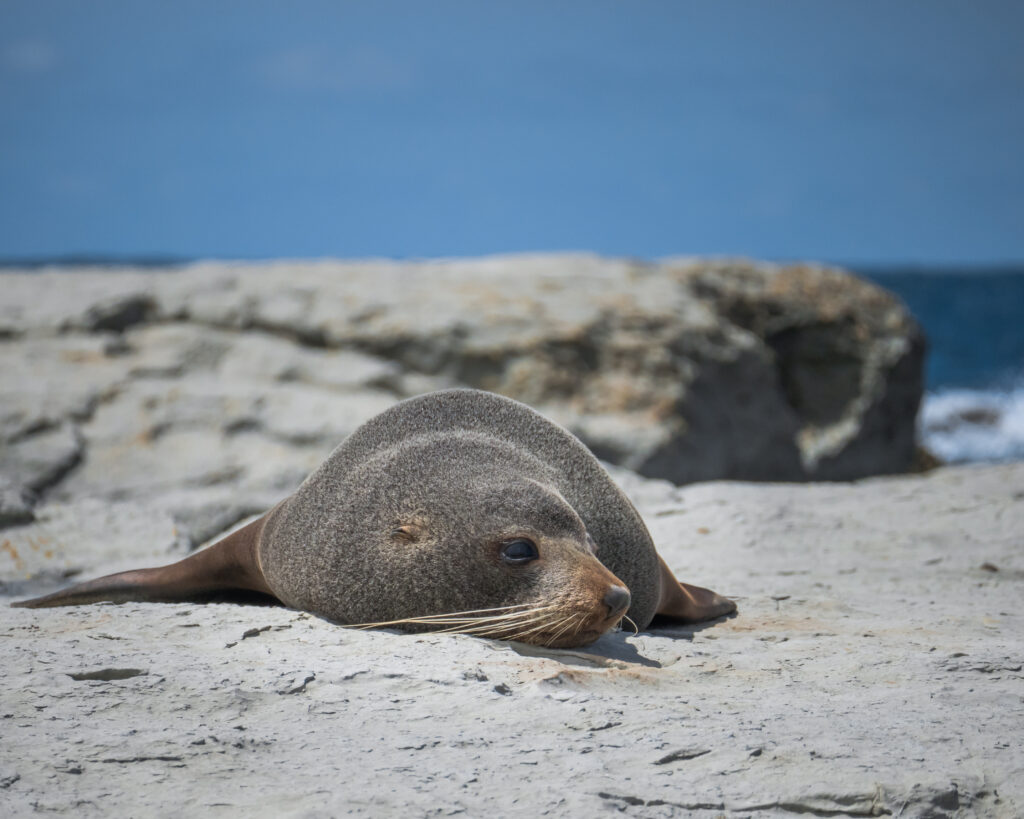The Diver
My lungs ache as I descend deep into my blue home.
My feet touch down and I dance across the sand beds, seaweed tickling my toes.
Ibu laut – the ocean – is quiet today. It’s getting quieter every time we come down here. Kabei, my father, blames the white powder everyone uses to catch fish. Before the powder appeared in the village markets, the ocean floor was covered with colourful towers teeming with life. Now, they stand still like tombstones. White and quiet.
But no one believes Kabei.
Instead of hand crafting spears, fishermen fill plastic coke bottles with the cheap powder to double their fish catch in half the time. My father, however, will not let me use the powder. He thinks it’s unnatural and a waste of my skills as a diver.
Watery, metallic sounds echo in my ears, calling me back to the surface. Home time.
Drifting over the white towers I pierce a small fish floating nearby. I don’t want to ascend empty handed. When I emerge, the other boys are hauling bulging plastic bags into our small wooden boat, laughing with delight at their white stained catch.
While the other boys are not looking, my friend Sulbin pulls me into the boat. In the water I am at ease, but up here is a different matter.
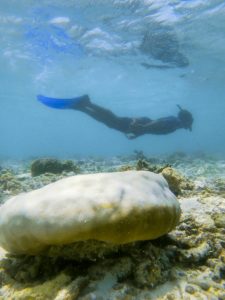
About a year ago, my mother took me to a doctor. We call him a bule because his face is white, like the paste my mother wears to protect herself from the sun. My mother was concerned about me after I collapsed while playing with the other boys. His eyes were heavy with regret as he explained the disease that’s making my muscles go weak. One day, I will lose the ability to walk…
My legs are trembling and I fight the urge not to cry when Sulbin’s brother gives my skinny arm a friendly punch. I do not return the favour.
Kabei says being skinny makes you a better diver because you can walk along the sea floor with more ease. But my legs, along with the rest of me, are slowly crumbling away – like the white towers beneath us.
The ocean slaps gently against the boat, calling us back. Sulbin passes me a paddle and we row back to shore. The boys and Sulbin chatter excitedly about the competition tomorrow. Ah yes, the free diving fishing competition. It’s a huge honour in our village to compete and prove your fishing skills. There’s no real prize for winning except for pride and respect from the elders. A prize most boys don’t value unless you need it. I need it.
A loud buzzing noise draws our attention to a boat carrying school students to their homes around the island. The boys snigger. We all went to school until we were 10 but our fathers believe that being able to fish and dive is more useful. Privately, my father also doesn’t want to carry me to school in front of everyone when I become too weak to walk.
Our boats gently bump against soft sand and the boys leap out to chase each other home, tossing an old t-shirt stuffed with seaweed between them. Sulbin and I carefully collect our things and slowly walk home. He asks if I am excited for the competition tomorrow and I nod silently. Although we don’t talk much, Sulbin is my neighbour and we have known each since we were babies. I guess that makes us best friends.
We wander through the streets that lead us home, ignoring the hissing and dirty looks of the villagers. They shield their children with their arms and knock my spindly legs with sticks. Sulbin protectively presses closer to me but I know that they won’t hurt me. People are just scared of my disease.
Once I’m home, I tentatively place my tiny fish on top of the abundant pile already on display in our kitchen. Kabei did better than me today which is no surprise – he’s the best fisherman in the village.
My mother is attentive with her knife, cleaning and picking away meat for dinner.
“Better luck tomorrow?”
I nod and follow the smell of tobacco to our tiny porch.
Kabei sits cross legged, watching smoke rings float and twirl around each other. His body trembles as his ribs shake with violent coughing. Despite our protests, he continues to smoke insisting that the tobacco is soothing.
“Good relaxation means good diving” he claims.
I watch him quietly as he begins to sing under his breath. His hands are covered with white powder and I quickly avert my eyes. My father has strong values, but it’s getting harder to catch fish. Feeding the family is valued above all else.
I close my eyes and listen to him sing to the night. His clothes smell heavily of fish and salt water, conjuring up my memory of today’s disastrous fishing trip. I hate disappointing him when I fail to deliver for the family. My family avoid blaming my legs out loud. But their eyes betray what their mouths refuse to admit.
“Better luck tomorrow” he murmurs.
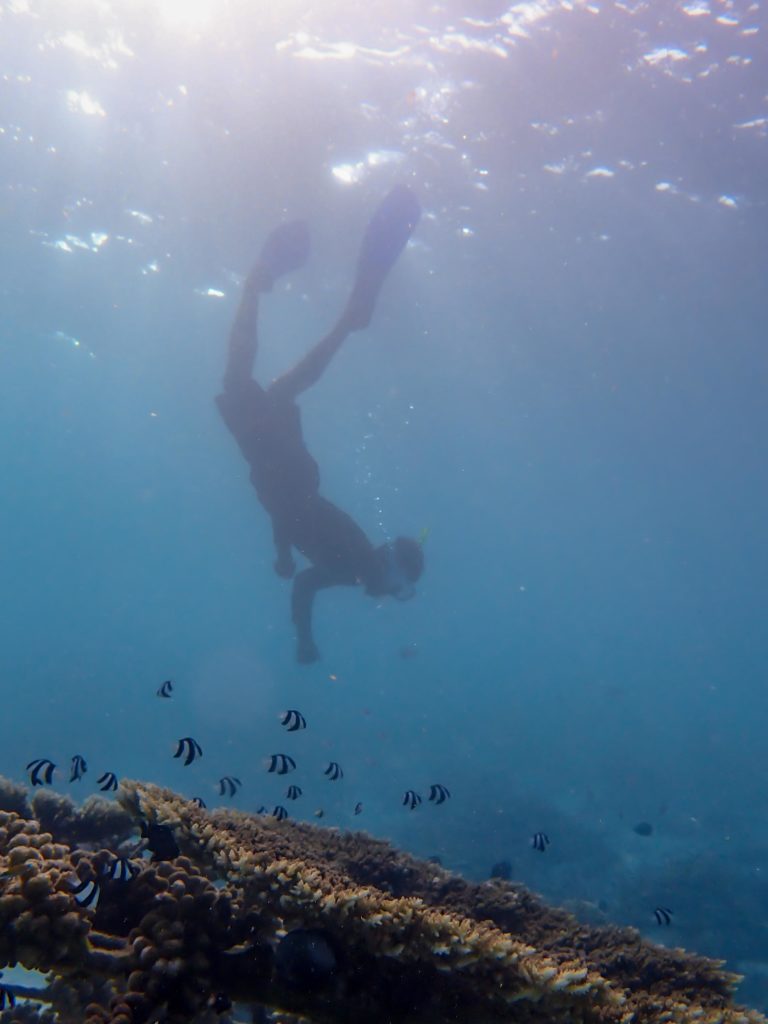
It’s early morning and I’m shaking with nerves as I lower myself into the water. Closing my eyes I begin to breathe slowly to calm my mind just like Kabei does before a big fishing trip. In one minute we will dive down to catch as many fish as we can in one breath. The longer you stay down, the more fish you can catch.
As the judge starts to count down, I do something Kabei would not approve of – I gulp and swallow air. The Bule doctor told me that competitive free divers do this before descending to help them dive longer.
The judge slams his spear into the water – the competition has begun!
I dive down head first and pump my legs and arms in a hard but rhythmic motion. As I sink down, my ears and chest begin to tighten. When I was old enough to walk, Kabei, along with the other fathers, taught all the children how to dive and swim. As future fishermen, diving lessons were the most important. We had to dive deeper and deeper until our ears hurt and our faces spilled blood. This was to make us better divers. The Bule doctor looked so sad when I told him this; children from his ocean do not dive as deep as we do.
My hands and feet begin to get cold and I grasp my spear tighter, searching the water for signs of movement other than the swarming limbs around me. I once asked the doctor why I get cold when I dive, even though the water is so warm. He explained that amazing things happen in your body when you dive. Your heart beat slows down to a quarter of its normal rate and blood shifts from your arms and legs to the more important parts of your body. By re-directing blood to essential organs, the body conserves air allowing you to dive longer. This is called the Mammalian Dive Reflex, and is present in many other diving animals such as penguins and seals.
As I continue to dive deeper, more and more blood flows into my chest, stopping it from being crushed by the weight of the water. It hurts, but I’m used to it.
I hear metallic tapping – we have been underwater for one minute.
Dozens of other boys bounce through the water like excited seal pups. Most of them are empty handed but not for long.
A school of fish appears from behind a large clump of seaweed. All at once, the boys swim furiously towards them. I start swimming with them but someone’s foot connects with my chest, forcing precious air bubbles from my mouth. The boys fight over the fish, piercing the water with their spears. Pretty soon, the boys tire and rise to the surface, bags bulging with prizes.
Finally, the ocean floor is calm and undisturbed. Only one other boy is left. He swims above me, scouting for something larger like I am. A larger fish such as a shark, earns you extra points, and respect, from the judges.
I drift over the white towers and scour the deep blue depths. Suddenly, I spot a shadow looming about 100m away. It’s long tail sweeps back and forth, driving its long lean body towards me. I recognise its pectoral fin and my heart begins to thump. This is it.
Ignoring the fourth round of tapping above, I pound my legs through the water, aiming left of the approaching fish. As it draws closer, I see its narrow nose and perfectly edged fins. This one’s a winner. As I close the distance between us, I begin swimming in a random, zig-zagged manner. I then punch my spear forwards, slamming it deep into its gills. Grabbing its pectoral fin with my spare hand to keep my body away from its jaws, I stab my spear deeper. The fish thrashes about but my legs are wrapped tight around its narrow body. I close my eyes and wait.
Slowly, its’ heart begins to falter and I begin my ascent, my fingers hooked under the shark’s gills.
Everything aches as I near the surface and my lungs are screaming for air. My face bursts through the surface and hands reach out to pull me into a large wooden canoe. Exhaustion washes over me and a strong smell of fish and salt fills my nostrils. As my eyes readjust, I realise I am in the judges boat, surrounded by dozens of fish sacks- my competitors trophies.
Gasps fill my ears and I turn to see the two judges standing over me, their mouths agape. I must look a horrendous mess with blood splattered all over my arms and my painfully skinny legs. Casting my eyes down in embarrassment, my heart suddenly bursts with laughter – the shark takes up almost half the boat! I now know there is no contest. The other boys have captured an impressive amount of fish but their reliance on the white powder has made them lazy.
I hear shouting and turn to see my father paddling over in his tiny boat. He’s grinning from ear to ear.
After some murmuring and polite counting, the judges heave the shark into the air and declare me the winner. To my surprise they hand me a huge sack of white powder. This is a valuable prize- it could catch enough fish to feed my family for a year. At first I accept out of politeness but then I exchange looks with my father. Hesitation and conflict cross his eyes but he nods knowingly.
Turning back to the judge I smile. He looks confused when I return the sack to his hands. It’s a generous offer, but I couldn’t have caught the shark with the white powder. I raise my spear and the crowd cheers. My father is the loudest of all.
Back on land, my father and I walk side by side with the shark slung over my shoulder. Villagers stand in their doorways to stare as we pass.
Their eyes lock with mine but when they glance down, it’s to look at my spear, and strong hands.
Authors note: This is a work of fiction inspired by National Geographic articles about the Bajau – an incredible group of people who are most at home in the sea.

